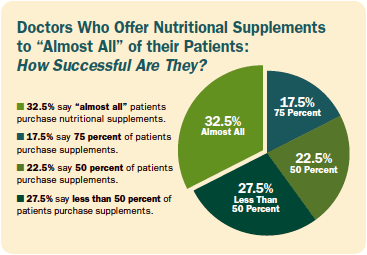Some doctors thrive in a personality-based clinic and have a loyal following no matter what services or equipment they offer, but for most chiropractic offices who are trying to grow and expand, new equipment purchases help us stay relevant and continue to service our client base in the best, most up-to-date manner possible. So, regarding equipment purchasing: should you lease, get a bank loan, or pay cash?
Where the Profession Is Going With Nutritional Supplements
According to a recent online survey, approximately 95 percent of practicing doctors of chiropractic offer nutritional supplements to their patients.1 With the exception of the chiropractic adjustment, no other form of care is as well-accepted as nutrition.
Many Choices
Doctors who are actively marketing to patients tend to offer them products from more vendors. In fact, the survey showed that a surprising 46 percent of DCs surveyed are now purchasing products from "four or more" different companies. This number climbs quickly, as more than 62 percent of DCs offer products from three or more companies. Only 8 percent of doctors stick to one brand. This coincides with recommendations from some experts that the greater number of choices presented to the patient, the greater the likelihood that the patient will purchase a product or service.
Price
The biggest issue relating to dissatisfaction with vendors came down to price. When asked why they stopped doing business with their former nutritional supplement vendor, 26 percent of DCs stated that the products were "too expensive." This was echoed by DCs who rated their satisfaction with their primary nutritional supplement vendor. Less than half "totally agreed" that the "pricing is very affordable" or that the "pricing represents a great value for the money."
Patient Sales
The same survey discovered what should be obvious, but is apparently not well understood by many doctors: the greater the proportion of patients given recommendations, the higher the rate of purchase.
Let's consider two groups: doctors who recommend supplements to at least half of their patients and a smaller subset who recommend to "almost" all their patients.
We will define the success rate as the percentage of sales made to at least half of the doctors' patient population.
Those who recommend to almost all" of their patients succeed 72.5 percent of the time with at least half of their patients, an excellent result.
The larger group of doctors, that is those who recommend to at least half their patients, succeed 60 percent of the time with half their patients. Keep in mind that this group of doctors does include the more "aggressive" practitioners who make recommendations to "almost all" patients. The results would be far lower if the more "aggressive" doctors were not included.

Bottom Line
Given the success revealed in this data, appropriately offering nutritional supplements to every patient should be the obvious choice.
DCs also seem to be taking a harder look at choices and prices. Most seem to understand the need for nutritional supplements and are responding well to the growing list of choices they enjoy from an increasing number of vendors.
Reference
- Nutritional Supplement Survey. Conducted by MPA Media, completed Sept. 16, 2009.



